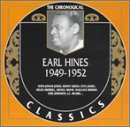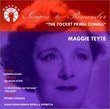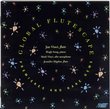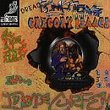| All Artists: Earl Hines Title: 1949-1952 Members Wishing: 1 Total Copies: 0 Label: Melodie Jazz Classic Original Release Date: 1/1/1949 Re-Release Date: 4/15/2003 Album Type: Import Genres: Jazz, Pop Style: Swing Jazz Number of Discs: 1 SwapaCD Credits: 1 UPC: 3307517128829 |
Search - Earl Hines :: 1949-1952
 | Earl Hines 1949-1952 Genres: Jazz, Pop
|
Larger Image |
CD DetailsSimilar CDs
|
CD ReviewsVivre France! Samuel Chell | Kenosha,, WI United States | 05/24/2004 (5 out of 5 stars) "I have no idea how this French company manages to keep producing, let alone finding a market for, these no-nonsense, carefully-documented collections of some of the best American jazz, as timeless as it is historic. Were it not for Melodie Jazz Classic (who subsidizes them--the French Academy?), most of this indispensable American music would be unavailable to the world.I ordered this album because of the rare documentation of Etta Jones' work with Fatha during this time. She's featured on only two tracks but easily "outsings" the other two vocalists, one of whom is Helen Merrill. Most of the album is devoted to Hines' piano--20 performances and over 60 minutes of consummate playing.Traveling with Louis Armstrong in Europe, Earl accepted an invitation to lay down a number of these tracks in Paris. Others were originally released on an early Columbia 10" LP. The highlights are the trio recordings (ten tracks, eight with Al McKibbon on bass and J. C. Heard on drums--all in full-range audio). Unlike Tatum, Hines' statement of the original melody is usually quite straight, even to the point of being rhythmically square. But then the fun begins. The polyrhythms and contrapuntal surprises of Hines' left hand are especially dazzling on the solo performances, and when a bass player is included, the right hand's virtuosity matches Tatum's, except with more elliptical melodic intervals and a far more biting, percussive attack. Ballads admittedly are not Hines' strong suit. There he makes his mark by eschewing Tatumnesque harmonic complexity in favor of disarming simplicity and direct statement.This recording represents Fatha at his peak. I doubt there's another period or set of performances from his career that finds him in better form."
|

 Track Listings (20) - Disc #1
Track Listings (20) - Disc #1



